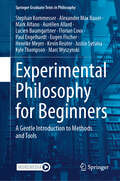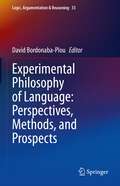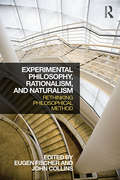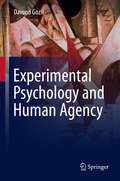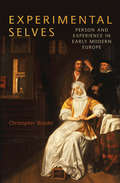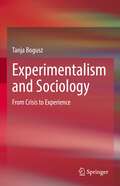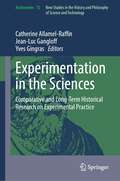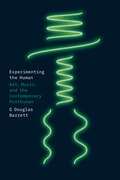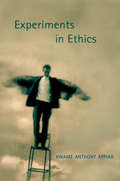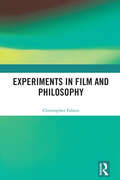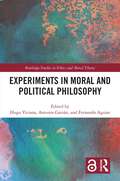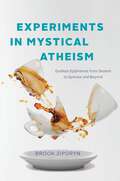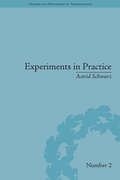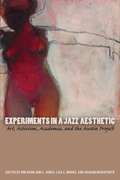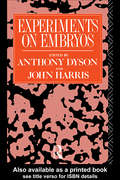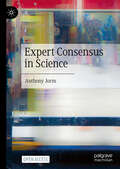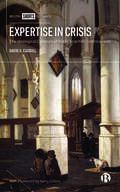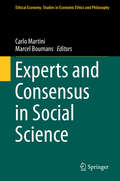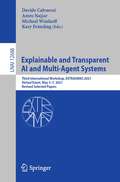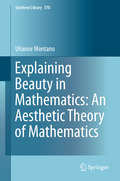- Table View
- List View
Experimental Philosophy for Beginners: A Gentle Introduction to Methods and Tools (Springer Graduate Texts in Philosophy)
by Mark Alfano Justin Sytsma Eugen Fischer Florian Cova Stephan Kornmesser Alexander Max Bauer Aurélien Allard Lucien Baumgartner Paul Engelhardt Henrike Meyer Kevin Reuter Kyle Thompson Marc WyszynskiThis graduate textbook provides a basic introduction to experimental philosophy (x-phi). In nine chapters, different methods and tools used in X-Phi are explained, spanning quantitative vignette studies, interactive experiments, corpus analysis, psycholinguistic experiments as well as qualitative interview studies. Each chapter introduces a specific experimental method by means of a case study in an easily accessible way and covers the whole research process from the development of a research question to the interpretation of the data.
Experimental Philosophy of Language: Perspectives, Methods, and Prospects (Logic, Argumentation & Reasoning #33)
by David Bordonaba-PlouThis book presents the current state of experimental philosophy of language, drawing attention to corpus methods. The volume highlights new trends in experimental philosophy of language, thus exploring the future’s discipline. It includes cross-linguistics studies that reveal the differences and similarities in how speakers of different languages use specific terms, and scrutinizes methodological advances used in experimental philosophy of language. The book also includes politically engaged experimental philosophy of language studies focusing on slurs, pejoratives, and hate speech. The topic’s interdisciplinary nature makes the volume of interest to a broad range of scholars across disciplines including philosophy, linguistics, philology, psychology, and computational linguistics.
Experimental Philosophy, Rationalism, and Naturalism: Rethinking Philosophical Method
by John Collins Eugen FischerExperimental philosophy is one of the most exciting and controversial philosophical movements today. This book explores how it is reshaping thought about philosophical method. Experimental philosophy imports experimental methods and findings from psychology into philosophy. These fresh resources can be used to develop and defend both armchair methods and naturalist approaches, on an empirical basis. This outstanding collection brings together leading proponents of this new meta-philosophical naturalism, from within and beyond experimental philosophy. They explore how the empirical study of philosophically relevant intuition and cognition transforms traditional philosophical approaches and facilitates fresh ones. Part One examines important uses of traditional "armchair" methods which are not threatened by experimental work and develops empirically informed accounts of such methods that can potentially stand up to experimental scrutiny. Part Two analyses different uses and rationales of experimental methods in several areas of philosophy and addresses the key methodological challenges to experimental philosophy: Do its experiments target the intuitions that matter in philosophy? And how can they support conclusions about the rights and wrongs of philosophical views? Essential reading for students of experimental philosophy and metaphilosophy, Experimental Philosophy, Rationalism, and Naturalism will also interest students and researchers in related areas such as epistemology and the philosophies of language, perception, mind and action, science and psychology.
Experimental Political Science
by Bernhard Kittel Wolfgang J. Luhan Rebecca B. MortonAn exploration of core problems in experimental research on voting behaviour and political institutions, ranging from design and data analysis to inferences with respect to constructs, constituencies and causal claims. The focus of is on the implementation of principles in experimental political science and the reflection of actual practices.
Experimental Psychology and Human Agency
by Davood GozliThis book offers an analysis of experimental psychology that is embedded in a general understanding of human behavior. It provides methodological self-awareness for researchers who study and use the experimental method in psychology. The book critically reviews key research areas (e.g., rule-breaking, sense of agency, free choice, task switching, task sharing, and mind wandering), examining their scope, limits, ambiguities, and implicit theoretical commitments. Topics featured in this text include: Methods of critique in experimental research Goal hierarchies and organization of a task Rule-following and rule-breaking behavior Sense of agency Free-choice tasks Mind wandering Experimental Psychology and Human Agency will be of interest to researchers and undergraduate and graduate students in the fields of experimental psychology, cognitive psychology, theoretical psychology, and critical psychology, as well as various philosophical disciplines.
Experimental Selves: Person and Experience in Early Modern Europe
by Christopher BraiderDrawing on the generous semantic range the term enjoyed in early modern usage, Experimental Selves argues that ‘person,’ as early moderns understood this concept, was an ‘experimental’ phenomenon—at once a given of experience and the self-conscious arena of that experience. Person so conceived was discovered to be a four-dimensional creature: a composite of mind or 'inner' personality; of the body and outward appearance; of social relationship; and of time. Through a series of case studies keyed to a wide variety of social and cultural contexts, including theatre, the early novel, the art of portraiture, pictorial experiments in vision and perception, theory of knowledge, and the new experimental science of the late-seventeenth and eighteenth centuries, the book examines the manifold shapes person assumed as an expression of the social, natural, and aesthetic ‘experiments’ or experiences to which it found itself subjected as a function of the mere contingent fact of just having them.
Experimentalism and Sociology: From Crisis to Experience
by Tanja BoguszThis book is based on the understanding that the diversity and heterogeneity of science and society are not only issue of critique, but engender experimental forms of collaboration. Building on John Dewey’s experimental theory of knowledge and inquiry, practice theory, science and technology studies and the anthropology of nature, the book offers a trenchant redefinition of a present-focused sociology as a science of experience in the spirit of experimentalism. Crisis, instead of being a mere problem, is understood as the baseline for creativity and innovation. Committed to the experimental pursuit, the book provides an experience-based methodological approach for an inter- and trans disciplinary sociology. Finally, it argues for a globalized and transformative sociological outreach beyond established epistemic and national borders. This book is of interest to sociologists and other social scientists pursuing experimentalism in theory, method and/or practice.
Experimentation in the Sciences: Comparative and Long-Term Historical Research on Experimental Practice (Archimedes #72)
by Yves Gingras Catherine Allamel-Raffin Jean-Luc GangloffThis book takes a novel approach by highlighting comparative and long-term historical perspectives on experimental practice. The juxtaposition of accounts of natural, social, and medical experimentation is very enlightening, especially because the authors put the emphasis on the different kinds of objects of experimentation (physical matter, chemical reagents, social groups, organizations, sick individuals, archeological remains) and demonstrate how much the kinds of objects matter for the practice of experimentation, its methods, tools, and methodologies. Taken together, the chapters raise several fascinating questions for further study: What do these different approaches have in common? Why do we call them “experimentation”? What are the intersections among the fields and their developments? The volume engages philosophical approaches that are not well known to Anglophone readers (Bachelard, Bergson, Bernard, Canguilhem, among others) and brings to attention a wealth of Francophone secondary literature on past and present scientific experimentation. The collection fills a yawning gap in science, science studies, and philosophy of science teaching, making it particularly valuable philosophers and historians of science in all subfields.
Experimenting the Human: Art, Music, and the Contemporary Posthuman
by G Douglas BarrettAn engaging argument about what experimental music can tell us about being human. In Experimenting the Human, G Douglas Barrett argues that experimental music speaks to the contemporary posthuman, a condition in which science and technology decenter human agency amid the uneven temporality of postwar global capitalism. Time moves forward for some during this period, while it seems to stand still or even move backward for others. Some say we’re already posthuman, while others endure the extended consequences of never having been considered fully human in the first place. Experimental music reflects on this state, Barrett contends, through its interdisciplinary involvements in postwar science, technology, and art movements. Rather than pursuing the human's beyond, experimental music addresses the social and technological conditions that support such a pursuit. Barrett locates this tendency of experimentalism throughout its historical entanglements with cybernetics, and in his intimate analysis of Alvin Lucier’s neurofeedback music, Pamela Z’s BodySynth performances, Nam June Paik’s musical robotics, Pauline Oliveros’s experiments with radio astronomy, and work by Laetitia Sonami, Yasunao Tone, and Jerry Hunt. Through a unique meeting of music studies, media theory, and art history, Experimenting the Human provides fresh insights into what it means to be human.
Experimenting the Human: Art, Music, and the Contemporary Posthuman
by G Douglas BarrettAn engaging argument about what experimental music can tell us about being human. In Experimenting the Human, G Douglas Barrett argues that experimental music speaks to the contemporary posthuman, a condition in which science and technology decenter human agency amid the uneven temporality of postwar global capitalism. Time moves forward for some during this period, while it seems to stand still or even move backward for others. Some say we’re already posthuman, while others endure the extended consequences of never having been considered fully human in the first place. Experimental music reflects on this state, Barrett contends, through its interdisciplinary involvements in postwar science, technology, and art movements. Rather than pursuing the human's beyond, experimental music addresses the social and technological conditions that support such a pursuit. Barrett locates this tendency of experimentalism throughout its historical entanglements with cybernetics, and in his intimate analysis of Alvin Lucier’s neurofeedback music, Pamela Z’s BodySynth performances, Nam June Paik’s musical robotics, Pauline Oliveros’s experiments with radio astronomy, and work by Laetitia Sonami, Yasunao Tone, and Jerry Hunt. Through a unique meeting of music studies, media theory, and art history, Experimenting the Human provides fresh insights into what it means to be human.
Experimenting the Human: Art, Music, and the Contemporary Posthuman
by G Douglas BarrettAn engaging argument about what experimental music can tell us about being human. In Experimenting the Human, G Douglas Barrett argues that experimental music speaks to the contemporary posthuman, a condition in which science and technology decenter human agency amid the uneven temporality of postwar global capitalism. Time moves forward for some during this period, while it seems to stand still or even move backward for others. Some say we’re already posthuman, while others endure the extended consequences of never having been considered fully human in the first place. Experimental music reflects on this state, Barrett contends, through its interdisciplinary involvements in postwar science, technology, and art movements. Rather than pursuing the human's beyond, experimental music addresses the social and technological conditions that support such a pursuit. Barrett locates this tendency of experimentalism throughout its historical entanglements with cybernetics, and in his intimate analysis of Alvin Lucier’s neurofeedback music, Pamela Z’s BodySynth performances, Nam June Paik’s musical robotics, Pauline Oliveros’s experiments with radio astronomy, and work by Laetitia Sonami, Yasunao Tone, and Jerry Hunt. Through a unique meeting of music studies, media theory, and art history, Experimenting the Human provides fresh insights into what it means to be human.
Experiments in Ethics (The Mary Flexner lectures #1)
by Kwame Anthony AppiahIn the past few decades, scientists of human nature—including experimental and cognitive psychologists, neuroscientists, evolutionary theorists, and behavioral economists—have explored the way we arrive at moral judgments. They have called into question commonplaces about character and offered troubling explanations for various moral intuitions. Research like this may help explain what, in fact, we do and feel. But can it tell us what we ought to do or feel? In Experiments in Ethics, the philosopher Kwame Anthony Appiah explores how the new empirical moral psychology relates to the age-old project of philosophical ethics. Some moral theorists hold that the realm of morality must be autonomous of the sciences; others maintain that science undermines the authority of moral reasons. Appiah elaborates a vision of naturalism that resists both temptations. He traces an intellectual genealogy of the burgeoning discipline of “experimental philosophy,” provides a balanced, lucid account of the work being done in this controversial and increasingly influential field, and offers a fresh way of thinking about ethics in the classical tradition. Appiah urges that the relation between empirical research and morality, now so often antagonistic, should be seen in terms of dialogue, not contest. And he shows how experimental philosophy, far from being something new, is actually as old as philosophy itself. Beyond illuminating debates about the connection between psychology and ethics, intuition and theory, his book helps us to rethink the very nature of the philosophical enterprise.
Experiments in Film and Philosophy
by Christopher FalzonChristopher Falzon argues in this book for a new way of understanding film as philosophy. Inspired and informed by the work of Michel Foucault, Falzon shows how a motion picture can operate not simply as a thought experiment but as a form of experience-centred, experimental reflection. It is film’s ability to show viewers things that challenge their way of thinking, giving them experiences that can make them think differently, that gives the film its status as philosophy. Through these cinematic experiences, not only cultural norms and presuppositions but also cinematic conventions, and even established philosophical positions, can be interrogated and questioned. Experiments in Film and Philosophy explores three films in the light of this new way of thinking about philosophy and film: Jean-Luc Godard’s Breathless, Rubin Ötlund’s Force Majeure, and Jonathon Glazer’s Under the Skin. It will be of interest to advanced students and scholars interested in the current debates about the relationship between film and philosophy.
Experiments in Moral and Political Philosophy (Routledge Studies in Ethics and Moral Theory)
by Hugo Viciana Antonio Gaitán Fernando AguiarThis volume presents new research on the use of experimental methodologies in moral and social philosophy. The contributions reflect the growing plurality of methodologies and strategies for implementing experimental work on morality to new domains, problems, and topics. Philosophers are exploring the ways in which empirical approaches can transform our idea of the good, our understanding of the social nature of norms and morality, and our methods of fulfilling ethical goals. The chapters in this volume extend experimental work on morality to previously underexplored areas. The contributions in Part 1 explore the methods and foundations of experimental work in areas such as folk moral judgments, metaethical beliefs, moral explanations, and reflective equilibrium. Part 2 focuses on issues in normative ethics and legal and political philosophy such as virtue ethics, utilitarianism, theories of justice, and criminal responsibility. Finally, the chapters in Part 3 tackle various applied ethical issues, including feminist X-Phi, animal welfare, experimental bioethics, and self-driving cars. Experiments in Moral and Political Philosophy will be of interest to scholars and advanced students working in ethics, applied ethics, experimental philosophy, social and political philosophy, and philosophy of law.
Experiments in Moral and Political Philosophy (Routledge Studies in Ethics and Moral Theory)
by Hugo Viciana Antonio Gaitán Fernando AguiarThis volume presents new research on the use of experimental methodologies in moral and social philosophy. The contributions reflect the growing plurality of methodologies and strategies for implementing experimental work on morality to new domains, problems, and topics.Philosophers are exploring the ways in which empirical approaches can transform our idea of the good, our understanding of the social nature of norms and morality, and our methods of fulfilling ethical goals. The chapters in this volume extend experimental work on morality to previously underexplored areas. The contributions in Part 1 explore the methods and foundations of experimental work in areas such as folk moral judgments, metaethical beliefs, moral explanations, and reflective equilibrium. Part 2 focuses on issues in normative ethics and legal and political philosophy such as virtue ethics, utilitarianism, theories of justice, and criminal responsibility. Finally, the chapters in Part 3 tackle various applied ethical issues, including feminist X-Phi, animal welfare, experimental bioethics, and self-driving cars.Experiments in Moral and Political Philosophy will be of interest to scholars and advanced students working in ethics, applied ethics, experimental philosophy, social and political philosophy, and philosophy of law. Chapter 1 and 15 of this book are available for free in PDF format as Open Access from the individual product page at www.taylorfrancis.com. They have been made available under a Creative Commons Attribution-Non Commercial-No Derivatives (CC-BY-NC-ND) 4.0 license.
Experiments in Mystical Atheism: Godless Epiphanies from Daoism to Spinoza and Beyond
by Brook ZiporynA new approach to the theism-scientism divide rooted in a deeper form of atheism. Western philosophy is stuck in an irresolvable conflict between two approaches to the spiritual malaise of our times: either we need more God (the “turn to religion”) or less religion (the New Atheism). In this book, Brook Ziporyn proposes an alternative that avoids both totalizing theomania and atomizing reductionism. What we need, he argues, is a deeper, more thoroughgoing, even religious rejection of God: an affirmative atheism without either a creator to provide meaning or finite creatures in need of it—a mystical atheism. In the legacies of Daoism and Buddhism as well as Spinoza, Nietzsche, and Bataille, Ziporyn discovers a critique of theism that develops into a new, positive sensibility—at once deeply atheist and richly religious. Experiments in Mystical Atheism argues that these “godless epiphanies” hold the key to renewing philosophy today.
Experiments in Practice (History and Philosophy of Technoscience #2)
by Astrid SchwarzTraditionally experimentation has been understood as an activity performed within the laboratory, but in the twenty-first century this view is being challenged. Schwarz uses ecological and environmental case studies to show how scientific experiments can transcend the laboratory.
Experiments in a Jazz Aesthetic
by Omi Osun Joni L. Jones Lisa L. Moore Sharon BridgforthIn Austin, Texas, in 2002, a group of artists, activists, and academics led by performance studies scholar Omi Osun Joni L. Jones formed the Austin Project (tAP), which meets annually in order to provide a space for women of colour and their allies to build relationships based on trust, creativity, and commitment to social justice by working together to write and perform work in the jazz aesthetic. Inspired by this experience, this book is both an anthology of new writing and a sourcebook for those who would like to use creative writing and performance to energize their artistic, scholarly, and activist practices. Theoretical and historical essays by Omi Osun Joni L. Jones describe and define the African American tradition of art-making known as the jazz aesthetic, and explain how her own work in this tradition inspired her to start tAP. Key artists in the tradition, from Bessie Award-winning choreographer Laurie Carlos and writer/performer Robbie McCauley to playwrights Daniel Alexander Jones and Carl Hancock Rux, worked with the women of tAP as mentors and teachers. This book brings together never-before-published, must-read materials by these nationally known artists and the transformative writing of tAP participants. A handbook for workshop leaders by Lambda Literary Award-winning writer Sharon Bridgforth, tAP's inaugural anchor artist, offers readers the tools for starting similar projects in their own communities. A full-length script of the 2005 tAP performance is an original documentation of the collaborative, breath-based, body work of the jazz aesthetic in theatre, and provides both a script for use by theatre artists and an invaluable documentation of a major transformative movement in contemporary performance.
Experiments on Embryos (Social Ethics and Policy)
by John Harris Anthony DysonCovering scientific, legal, ethical, historical, theological and public policy aspects of human embryo research, the cases for and against are put strongly and clearly. Scientific evidence is cogently presented by leading embryologists.
Expert Consensus in Science
by Anthony JormThis Open Access book shows how expert consensus pervades all areas of science. It explores, in particular, the role of consensus in establishing scientific truth, in guiding professional practice and policy and agreeing on what are acceptable scientific methodologies. For some scientific issues, a consensus forms spontaneously among scientists working on a topic, while for others, where the issues are complex, a formal deliberative consensus process is commonly needed. Deliberative consensus processes are becoming more important as scientists increasingly deal with complex multi-disciplinary issues of policy importance such as climate change due to human activity. While deliberative consensus processes are commonly used, they often lead to criticism from consensus skeptics. The book argues that deliberative consensus processes in science can be improved and proposes a number of realistic ways forward, ending with a discussion of whether communicating the scientific consensus on a topic is a good way to persuade the public.
Expertise in Crisis: The Ideological Contours of Public Scientific Controversies
by David S. CaudillWhen the utility of masks or vaccinations became politicized during the COVID-19 pandemic and lost its mooring in scientific evidence, an already-developing crisis of expertise was exacerbated. Those who believe in consensus science wondered: “How can ‘those people’ not see the truth?” With a foreword by Harry Collins, this book shows that the crisis is not a scientific controversy, but an ideological dispute with believers on both sides. If the advocates for consensus science acknowledge the uncertainties involved, rather than insisting on cold, hard facts, it is possible to open a pathway towards interaction and communication, even persuasion, between world views. As the crisis of expertise continues to be a global issue, this will be an invaluable resource for readers concerned about polarized societies and the distrust of consensus science.
Experts and Consensus in Social Science
by Carlo Martini Marcel BoumansThis book brings together the research of philosophers, sociologists, and social scientists. It examines those areas of scientific practice where reliance on the subjective judgment of experts and practitioners is the main source of useful knowledge to address and possibly, bring solutions to social problems. A common phenomenon in applications of science is that objective evidence does not point to a single answer or solution, to a problem. Reliance on subjective judgment, then, becomes necessary, despite the known fact that hunches, even those of putative experts, often provide information that is not very accurate, and that experts are prone to fallacies and biases. The book looks at how experts reach consensus in the social sciences, and which experts are relevant to which problems. It aims to answer many questions, the main one being: Can we start building a normative theory of expertise on the basis of the evidence that social scientists, sociologists and philosophers have uncovered?
Experts, Networks and International Law
by Joanna Harrington Holly Cullen Catherine RenshawHighlighting how the challenges raised by globalization - from environmental management to financial sector meltdowns - have encouraged the emergence of experts and networks as powerful actors in international governance, the contributions in this collection assess the methods and effectiveness of these new actors. Unlike other books that have focused on networks or experts, this volume brings these players together, showing how they interact and share the challenges of establishing legitimacy and justifying their power and influence. The collection shows how experts and networks function in different ways to address diverse problems across multiple borders. The reader is provided with a broader and deeper practical understanding of how informal authority actually operates, and of the nature of the relationship between different actors involved in policymaking. Through a range of case studies, the contributions in this collection explain how globalization is reshaping traditional forms of power and authority.
Explainable and Transparent AI and Multi-Agent Systems: Third International Workshop, EXTRAAMAS 2021, Virtual Event, May 3–7, 2021, Revised Selected Papers (Lecture Notes in Computer Science #12688)
by Davide Calvaresi Amro Najjar Kary Främling Michael WinikoffThis book constitutes the proceedings of the Third International Workshop on Explainable, Transparent AI and Multi-Agent Systems, EXTRAAMAS 2021, which was held virtually due to the COVID-19 pandemic.The 19 long revised papers and 1 short contribution were carefully selected from 32 submissions. The papers are organized in the following topical sections: XAI & machine learning; XAI vision, understanding, deployment and evaluation; XAI applications; XAI logic and argumentation; decentralized and heterogeneous XAI.
Explaining Beauty in Mathematics: An Aesthetic Theory of Mathematics
by Ulianov MontanoThis book develops a naturalistic aesthetic theory that accounts for aesthetic phenomena in mathematics in the same terms as it accounts for more traditional aesthetic phenomena. Building upon a view advanced by James McAllister, the assertion is that beauty in science does not confine itself to anecdotes or personal idiosyncrasies, but rather that it had played a role in shaping the development of science. Mathematicians often evaluate certain pieces of mathematics using words like beautiful, elegant, or even ugly. Such evaluations are prevalent, however, rigorous investigation of them, of mathematical beauty, is much less common. The volume integrates the basic elements of aesthetics, as it has been developed over the last 200 years, with recent findings in neuropsychology as well as a good knowledge of mathematics. The volume begins with a discussion of the reasons to interpret mathematical beauty in a literal or non-literal fashion, which also serves to survey historical and contemporary approaches to mathematical beauty. The author concludes that literal approaches are much more coherent and fruitful, however, much is yet to be done. In this respect two chapters are devoted to the revision and improvement of McAllister's theory of the role of beauty in science. These antecedents are used as a foundation to formulate a naturalistic aesthetic theory. The central idea of the theory is that aesthetic phenomena should be seen as constituting a complex dynamical system which the author calls the aesthetic as process theory. The theory comprises explications of three central topics: aesthetic experience (in mathematics), aesthetic value and aesthetic judgment. The theory is applied in the final part of the volume and is used to account for the three most salient and often used aesthetic terms often used in mathematics: beautiful, elegant and ugly. This application of the theory serves to illustrate the theory in action, but also to further discuss and develop some details and to showcase the theory's explanatory capabilities.
